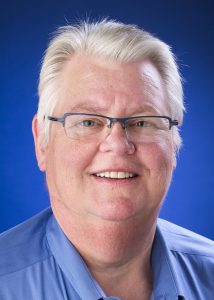A Career Crafted by Strong Hands and a Big Heart
Lindsay Pulsifer (MBA 2007), managing director of the maritime division for the Port of Seattle, admits that she had no clue what she was getting into when she entered the EMBA program at 55 years old. She describes her career path toward her current executive role as unusual. “I’ve been with the Port for 32 years. I started as a crane mechanic and had always worked with my hands. That was what I knew.”

Lindsay Pulsifer, Interim Maritime Division Managing Director at the Port of Seattle, 14 August 2015.
Before considering an MBA path, Pulsifer had been working on a Port project that once completed, would put her “out of business.” At that juncture she began to worry about her job skills and the uncertainty of what would come next. Her daughter was about six years old. Pulsifer was 36.
Fortunately, her boss recognized that Pulsifer understood more than how to work with her hands. “There was work related to my craft, regarding equipment safety and preventive procedures, which I knew a lot about,” she says. “My work overlapped with a lot of trades. My boss asked me to come indoors. He had some projects he thought I could help with.”
Pulsifer enthusiastically describes the transition. “I learned how to type and use a computer. This was a huge change. Though I wanted to work with my hands, I could see I’d be faced with the choice of leaving the union. It was difficult but also nice, because for the first time, I had a regular work schedule and could actually take a bus to work.”
She managed contracts, monitored work safety and did budgeting work for the safety department, moving up in various supervisory roles. Ultimately, Pulsifer ran the maintenance department for 17 years. She had a good relationship with the CEO at the time, with whom Pulsifer say she had “chest bumped” when she was the union representative. He had gone through the EMBA program and suggested it to Pulsifer, telling her to let him know when she was ready.
“He once told me, ‘If you have an MBA, no one asks about your BA,’” she shares. “I chuckled and told him I had an MRW — Master’s in Real Work. When I entered the MBA program, I had a high school diploma, a driver’s license and a journey card. I had not one minute of prior college, and I had no clue as to what I was getting myself into. I’d always worked with my hands and learned while I earned. It was a very different perspective than writing papers and studying.”
At age 55, Pulsifer found that school was a difficult, unusual challenge. She says she couldn’t have imagined how much time or attention it would require. But even as she was overwhelmed, she approached it the way she approached her work. “I just dug in and did what needed to be done.”
Pulsifer spent a year studying for the GMAT and got herself some tutors. She attended the pre-term summer school prior to the start of the MBA program, though she recalls the time as humiliating. “That summer program focused on algebra and calculus, and I knew math was going to be a huge challenge. I was completely out of my element,” she says. “But it was also interesting to see how differently minds work. I genuinely could not understand what they — other students and professors — were talking about. Calculus? My brain wouldn’t go there. What I did know was operations management and how some of those financial concepts worked in the real world. That’s where I had something really different to offer the class. The kind of experience I already had was eye opening. I was the only laborer and operations manager. I actually understood the full equation.”

CMA CGM Benjamin Franklin at T-18, 29 February 2016
Although the finance area of her MBA education was a challenge, it was also a blessing. “I learned that numbers really matter. Not that I didn’t get that before, but I learned how to pay a different kind of attention to them,” she explains. “Bob Bowen brought some life to the topic of numbers and also helped us see the stories that financial information can tell. His love of and commitment to teaching accounting helped me get past only thinking of ‘budget’ like a checkbook.”
There was one other challenge that turned into an advantage. Having had a substantial career as a union member and representing union members, she knew there were vastly differing opinions and misperceptions about union workers. “I had to challenge many, including professors, about their ideas of labor being bad,” she says plainly. “A lot of the companies represented by the students were anti-union. Those biases were pretty clear.”
She adds, “They were all challenged by models of what they knew. When research about businesses had been provided, none of the examples ever included anyone from a union. They saw a particular perspective. I got to offer the insight that being a bureaucrat can be an honorable, welcome thing. It can bring stability to instability. Unions can draw people who really want to make a difference. In my class, there were only one or two other public workers.”
In this regard, Pulsifer says that a key asset of the EMBA Program was professors and students who were willing to learn from differing viewpoints. ”The program reinforced the value of diversity of thought in decision making. As we all worked on the required projects and got more comfortable with each other, our different perspectives emerged and we had excellent discussions. We helped each other learn.”

UW Business Plan Competition
The capacity to understand a broad range of viewpoints through a business lens added to Pulsifer’s career success. After 20 years in management, and with her MBA completed, another big opportunity arrived. Her predecessor quit and Pulsifer was tapped to step in as interim director. She says that without her MBA, she never would have been considered for or been able to take on the job.
“Having the job I have now would have been impossible. There were 200 people to manage and multiple lines of business to understand. After I came in as interim director, they made me a direct appointee, which never happens. Without my MBA, I wouldn’t have understood the concept of ‘Where is the sweet spot?’ Now I can analyze moorage rates, rent rates, how much we’re paying people, what level of service we want to offer, strategic planning for what kinds of businesses we want to be in. These are the ways my education shows up in my experience.”

Harbor aerials of container terminals, SODO industrial area, Duwamish industrial area, SIG and ARGO rail ramps, major freight routes and transload facilites, all from 10,000 feet, 29 October 2013
Pulsifer says that because of her longer, harder journey, she makes sure to mentor both inside and outside her chain of command. “We’re a large, complex organization. The Port of Seattle brings together a lot of business activity. I teach those I work with to be better business managers. I teach them about strategic long-term planning and perspectives to build and ensure they’re solidly running their businesses. I ask them to ask more of themselves, so that collectively we can move ahead.”
From a unionized port crane mechanic to a managing director, Pulsifer acknowledges that her career path was unusual — and takes immense pride in her labor background. She feels honored that she’s been able to fully participate in both aspects of business. She also recognizes that her MBA was instrumental.
“I recommend the program to many people. I tell them the truth, for me anyway: that getting an MBA is a hard thing to do, but that it’s totally worth it.” She concludes with the advice of someone who has been there. “You have to get things real with your family, because it can be hard on them. But most important, you will get out of it all you put into it.”
